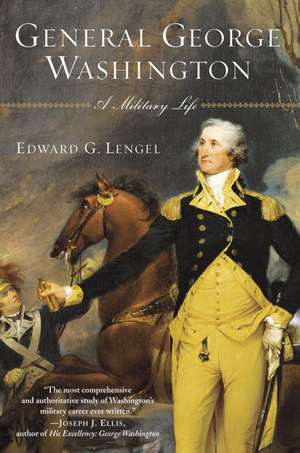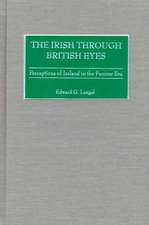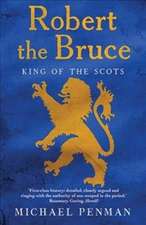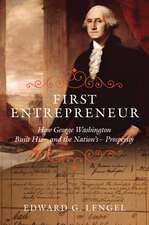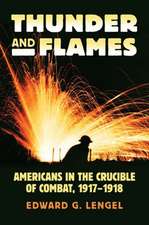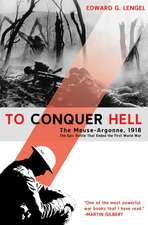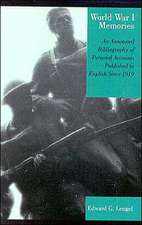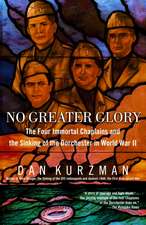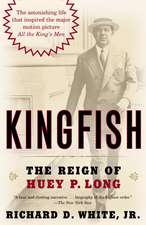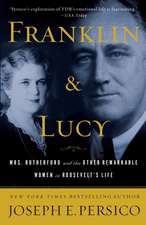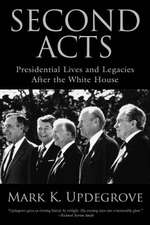General George Washington: A Military Life
Autor Edward G. Lengelen Limba Engleză Paperback – 31 dec 2006 – vârsta de la 14 până la 18 ani
Vezi toate premiile Carte premiată
George Washington Book Prize (2006)
–Joseph J. Ellis, author of His Excellency: George Washington
Based largely on George Washington’s personal papers, this engrossing book paints a vivid, factual portrait of Washington the soldier. An expert in military history, Edward Lengel demonstrates that the “secret” to Washington’s excellence lay in his completeness, in how he united the military, political, and personal skills necessary to lead a nation in war and peace. Despite being an “imperfect commander”–and at times even a tactically suspect one–Washington nevertheless possessed the requisite combination of vision, integrity, talents, and good fortune to lead America to victory in its war for independence. At once informative and engaging, and filled with some eye-opening revelations about Washington, the American Revolution, and the very nature of military command, General George Washington is a book that reintroduces readers to a figure many think they already know.
“The book’s balanced assessment of Washington is satisfying and thought-provoking. Lengel gives us a believable Washington . . . the most admired man of his generation by far.”
–The Washington Post Book World
“A compelling picture of a man who was ‘the archetypal American soldier’ . . . The sum of his parts was the greatness of Washington.”
–The Boston Globe
“[An] excellent book . . . fresh insights . . . If you have room on your bookshelf for only one book on the Revolution, this may be it.”
–The Washington Times
Preț: 151.15 lei
Nou
Puncte Express: 227
Preț estimativ în valută:
28.92€ • 30.93$ • 24.12£
28.92€ • 30.93$ • 24.12£
Carte disponibilă
Livrare economică 27 martie-10 aprilie
Preluare comenzi: 021 569.72.76
Specificații
ISBN-13: 9780812969504
ISBN-10: 0812969502
Pagini: 450
Ilustrații: 15 MAPS; 16-PP INSERT
Dimensiuni: 155 x 233 x 28 mm
Greutate: 0.43 kg
Editura: Random House Trade
ISBN-10: 0812969502
Pagini: 450
Ilustrații: 15 MAPS; 16-PP INSERT
Dimensiuni: 155 x 233 x 28 mm
Greutate: 0.43 kg
Editura: Random House Trade
Notă biografică
EDWARD LENGEL is associate professor of history at the University of Virginia and associate editor of The Papers of George Washington. A specialist in military history, he is the author of World War I Memories and The Irish Through British Eyes.
From the Hardcover edition.
From the Hardcover edition.
Extras
1
YOUNG FRONTIERSMAN
May 1741 – February 1753 At the end of May 1741, a young American officer stood sweltering on the sun-baked deck of a warship off the coast of Jamaica. Transports full of red-coated soldiers surrounded him, clogging the horizon with wooden hulls, masts, and sails that announced the presence of a British expeditionary army. As a captain in the provincial infantry, he occupied only a small corner of that army, and counted for little; but as an American he felt proud to participate in Great Britain’s glorious military tradition. Or at least he had at first. Now all reason for pride had gone. The army was dying. It had won no laurels, just a watery shroud. Most of the men had perished in the last four months, and disease stalked every survivor. As the American captain watched, daily burials at sea became feasts for frenzied sharks. He had no reason to think that he would not end the same way. Officers enjoyed no immunity to tropical disease or ignominious burial. Like all soldiers, Captain Lawrence Washington found refuge in thoughts of home. He came from Fredericksburg, Virginia, over a thousand miles away. He had not been there in over a year. Letters took weeks to travel each way, and often never arrived at all. Still, writing to his loved ones could make them seem closer, so retreating from the sun to his cabin or a shady place on deck, he turned from the horrors surrounding him, took up a pen, and wrote a letter to his father.
Lawrence Washington wrote as a recent eyewitness to the most important battle of the War of Jenkins’ Ear, and as a participant in its miserable aftermath. Named after the alleged mutilation of English sailor Robert Jenkins, the conflict had started in the summer of 1739 as a minor colonial fray between Great Britain and Spain. The bloodletting centered in the Caribbean, where the British sought to strangle Spain’s communications with the gold and silver mines of South America by snatching some of her outposts. Victors of the war’s early encounters, the British expected to make short work of the decrepit Spanish empire by capturing the important port of Cartagena off the northeast coast of South America. After this, with the Spanish reeling, they expected to move on to seize the even more important settlement of Havana on the island of Cuba. As plans for its Caribbean offensive jelled in 1739, the British government announced its intention to form an American regiment to serve as part of an amphibious army of six marine regiments and other regular units. Virginia, whose governor was appointed to command the regiment, provided the largest number of volunteers when recruitment began in the spring of 1740. The common Virginians made unimpressive soldiers—a British observer called them “Blacksmiths, Tailors, Barbers, Shoemakers, and all the Banditry the colonies afford”—but their officers were privileged, cultured, and generally intelligent young men, anxious to earn good reputations in battle. Sons of the Old Dominion had besieged colonial officials with requests for commissions, and Lawrence Washington was one of the many who lobbied fiercely for the four captaincies available from his colony. Thanks to his family’s influence and his own considerable personal charm, he received the highest-ranking spot.
The newly appointed Captain Washington followed the American Regiment to Jamaica near the end of 1740. At first, his soldiers showed little promise. Like the British redcoats, the American enlisted men came from the scum of society; and the Virginians stood out even in such rough company. Among them were vagrants, loafers, cutpurses, and former convicts. Soldiering did not come naturally to them, as Lawrence and his fellow officers swiftly discovered. They looked bad, too. Only about one in every six of the scrawny, ill-fed men possessed a uniform. British Brigadier General Thomas Wentworth reviewed the Americans on Jamaica in January 1741 and shook his head at the spectacle they presented. Yet there was some innate quality in the common soldiers that he liked. Under proper leadership and discipline, he decided, they might eventually prove useful. For American officers, on the other hand, he expressed complete and unreserved contempt. Branding them naïve and stupid, and certain that they would falter in combat, he attempted to replace them with British regulars. But by then the scruffy American enlisted soldiers had bonded with their young officers, and they bluntly refused to serve under anyone else. Irritated, Wentworth relented, but he privately resolved to keep all of the Americans on shipboard during the approaching campaign. It was inconceivable to him that the redcoats might need their provincial allies’ support. Wentworth commanded the land element of the expeditionary force of 8,000 British regulars and 3,000 Americans that left Jamaica in February 1741. The fleet carrying his troops sailed under Admiral Edward Vernon, a fifty-five-year-old, ill-tempered naval commander known in the fleet as “Grog” because of his grogram cloak. Sailors also applied this nickname to the watered-down rum that he forced upon them. But the ribbing was good- natured. Vernon’s capture of Porto Bello on the Panamanian isthmus in November 1739 had made him a popular hero. Capturing Cartagena would add to his reputation and clear the way for other conquests in the Caribbean. The fleet dropped anchor off Cartagena in early March 1741, and the redcoats quickly debarked, eager to fight. Yet their enthusiasm availed little in the ensuing six weeks as the expedition foundered and disintegrated. The British easily invested the port, but instead of storming its fortifications, Vernon and Wentworth quarreled over the plan of attack.
Finally, after weeks of dithering that left the troops gravely weakened by dysentery and malaria, the British launched a large-scale assault on April 9th. Their officers bungled the advance, and the well-entrenched Spanish refused to budge. Nearly 700 redcoats fell slain without penetrating the enemy entrenchments. The siege then stalled while the British returned to the ships where their American allies had spent the last month languishing in stifling heat. Though spared the horrors of battle, the colonials had not been able to avoid the equally appalling threats of heatstroke, fever, and disease. British surgeons and their assistants—among them a young writer named Tobias Smollett—struggled to care for the sick and wounded, and as soldiers perished in increasing numbers, discipline collapsed. Officers gave up on their duties and avoided their haggard men. The living casually dumped the bodies of dead comrades overboard, strewing the waters of Cartagena with bloated corpses. The trail of bodies led all the way to Jamaica, where the fleet arrived several weeks after abandoning its siege. But that island offered little relief, and the fever epidemic continued unabated. The army’s effective strength rapidly fell to fewer than 2,000 British and just over 1,000 Americans. Captain Lawrence Washington, by some miracle still alive and apparently healthy despite the carnage surrounding him, had the Cartagena fiasco fresh in his mind as he wrote to his father from on board the British warship in May 1741. The crisis continued as he wrote, and the expeditionary force still wasted away. Total disintegration was near. Yet he knew the keen anticipation with which his news-starved family would read his letter. His father would seek war news as well as hints on the state of trade and commerce in the Caribbean. His mother would want to know about Lawrence’s health, and to hear about the fates of other friends and relations. And nine-year-old George, Lawrence’s half brother, would look for descriptions of the roar of the cannon or the sight of infantry boldly charging the Spanish fortifications. None of them would want to hear about a disaster. Lawrence wrote his letter with a mixture of sulkiness and reticence, providing only the briefest summary of the terrible expedition. He did not, or could not, bear to confess that the American Regiment had succumbed to disease without firing a shot. Instead he hid the truth with gentle boasting, including some lines possibly intended for George. “Our Regiment has not recd that treatment we expected,” Lawrence wrote, “but I am resolved to persivere in the undertaking. War is horrid in fact, but much more so in imagination; We there learn’d to live on ordinary diet, to watch much, & disregard the noise, or shot of Cannon.” These words must have impressed themselves on the boy’s memory, for he echoed them with his own pen thirteen years later.
Lawrence returned to Fredericksburg in January 1743 after Admiral Vernon discarded his government’s grandiose plans for the conquest of the Carib-bean and sent the exhausted troops home. No parades greeted the Americans, who had failed to garner any kind of military glory. Most of the young officers who had left Virginia so confidently in 1740 had not fallen nobly in battle but died in squalid ships’ holds before being dined upon by sea creatures. Veterans discovered that society had grown used to getting on without them, and the best jobs, honors, and appointments had already been taken by the stay-at-homes. The thought that he had squandered some of the most important years of his life must have lain heavily on Lawrence’s mind. Yet a child’s love can heal many wounds, as Lawrence learned from his admiring young half brother George. The two came from a large family. Their father, Augustine, born in 1694, was a soft-spoken but energetic and physically powerful man. In 1738 he had settled at Ferry Farm, which stood across the Rappahannock River from Fredericksburg, and he now owned 10,000 acres and fifty slaves. His first wife, Jane Butler, died in 1729 after bearing three children: Lawrence (born around 1717), Augustine Jr., and Jane. Augustine Sr.’s second wife, the orphan Mary Ball, who had been born around 1708, gave birth to five more children. George, born February 22, 1732, according to the new calendar adopted in 1752, was the first. He was followed by Betty, Samuel, John Augustine, and Charles.
Among all of his siblings, George developed the strongest bond with Lawrence. And who could blame him for that? People liked Lawrence. Physically plain, he earned friends with kindness, affability, and good manners. Several years of schooling in England before the war had taught him grace- ful deportment and elegant handwriting. He lacked practicality and business sense, but to a child this may have made him all the more appealing. Lawrence was the type of man who set his own work aside in order to answer childish questions that others dismissed as foolish or irrelevant, and George’s questions—which doubtless included how an officer drilled his men, what it felt like to stand on the deck of a warship with all guns ablaze, how it looked when landing boats full of British soldiers set out for shore, and how it sounded when the rattle of musketry and cannon announced their attack—always found a friendly ear. The siblings’ relationship grew as the Washington family settled down to everyday life in the first months of 1743. Lawrence came and went as he angled to become adjutant general of the Virginia Militia. George’s younger brothers and sister grew under the care of Mary Washington, servants, slaves, and tutors. George had a tutor—according to one tradition a convict servant—and he learned quickly. As a reward for his studies, or maybe just to get him out of Lawrence’s hair, Augustine decided in the spring of 1743 to send the boy off to visit some cousins living in the Chotank district on the Northern Neck of the Potomac River. George enjoyed the visit, but it did not last long.
In early April, his father, to all appearances healthy and vigorous, rode out in a storm and fell ill. Within a short time, his condition was grave. A messenger called George home, but when he reached Ferry Farm he learned that Augustine had passed away, on April 12th. Augustine’s sudden death at age forty-nine left George and the rest of the family shorn of a vital source of strength and stability. Adults and children alike would have to assume more responsibilities. Augustine’s will gave Ferry Farm to George, but if his family told him about the inheritance he may have felt more fear than satisfaction at gaining such a valuable tract. At eleven years old he was far too young to manage it, and without careful stewardship the estate could easily fall into ruin—or out of his hands altogether—before he reached his majority. Fortunately, two relatives took control of the farm’s affairs and his own. With remarkable energy, Mary Washington managed Ferry Farm while raising George and his younger siblings. Lawrence, who had inherited a plan-tation on Little Hunting Creek, meanwhile took time out from his own responsibilities to supervise George’s education and upbringing. Over time Lawrence rapidly took on the role of substitute father, guiding the development of George’s interests and personality as he became a young man.
The teenage George Washington was neither the budding Hercules of his hagiographers nor the vain, ambitious nonentity concocted by some debunking historians. He was neither an intellectual nor a yokel, but a typical, somewhat precocious boy eager to learn about the world and distinguish himself in it. Inherently somewhat reserved, he nevertheless made several close friends, boys his own age for the most part. In their early teens, they probably shared tales of war and adventure; later on they traded boasts on their affairs of the heart. “I might perhaps form some pleasures in the conversations of an agreeable young Lady,” George wrote a cousin when he was about seventeen, “as there[’s] one now Lives in the same house with me but as thats only nourishment to my former Affair for by often seeing her brings the other into my remembrance.” Washington stood about six feet tall by the time he was a young adult, a height that made him tower over most of his contemporaries. A fine posture, acquired under Lawrence’s careful tutelage, complemented his height. At twenty-eight a friend called him “as straight as an Indian.” Large of bone but well-proportioned, he possessed a fine mop of dark brown hair over a face with regular and firm but pleasant features. His only physical defects were a slight case of amblyopia, or “wandering eye,” and increasingly bad teeth. Most imposing was the athletic physique he maintained throughout his youth and early manhood.
David Humphreys, his friend and early biographer, wrote that Washington often claimed that “he never met any man who could throw a stone to so great a distance as himself; and, that when standing in the valley beneath the natural bridge in Virginia, he has thrown one up to that stupendous arch”—a height of about 215 feet. In the social graces—prerequisites for entrance into polite society in eighteenth-century Virginia—Washington also excelled. Lawrence understood the value of good breeding from his own experience and probably played a crucial role in educating George in what Humphreys called “the graceful accomplishments of dancing, fencing, [and] riding.” He was an excellent horseman, and spent days riding and hunting in the Virginia countryside. Dancing grew to become one of Washington’s favorite pastimes, and his skill in the ballroom, and in pleasant conversation at the table, made him a welcome guest in the homes of politically influential neighbors. Another factor in his favor was the care he took with his clothing, a quality he practiced to a degree exceptional even by contemporary standards.
From the age of sixteen—when he wrote for his own reference an elaborately detailed description of his next suit of clothes—to the end of his life, Washington took great pleasure in dressing well. Some historians have interpreted Washington’s emphasis on proper social bearing, appearance, and conduct as vanity. Yet at this time and place, a man had to cultivate a good public image in order to rise in society. A reputation for amiability and probity was especially important for an ambitious youngster like Washington. Although the well-known “Rules of Civility and Decent Behaviour in Company and Conversation” that he copied when he was sixteen had originated in a sixteenth-century French work rather than from his own imagination, he tried scrupulously to follow the 110 maxims in his own personal conduct. Throughout his life, and especially as he embarked on public careers in the military and in politics, he jealously guarded his reputation, taking care to allow others no excuse to question his conduct. Washington’s fixation eventually reached the point where he would turn savagely on any critics, especially anyone who challenged his rights and prerogatives. As a young man, when Washington had not yet learned to harness his emotions, they militated against the image of politeness and self-control he fought so hard to maintain.
Frustrated over military or business affairs, he would write hasty, overdramatic letters to friends or rivals. Washington the general and president later mastered, to some extent, the gentle art of exaggeration, calculating the occasional written display of outrage or despondency in order to get what he wanted; but as a young man he had not yet perfected his persuasive techniques. As a result he alienated some people, including Virginia governor Robert Dinwiddie and Brigadier General John Forbes, who had helped to foster his career as a soldier. In person, Washington usually maintained self-control. Although anger could on rare occasions drive him to cursing—and a change of facial expression that witnesses never forgot—he never became physically threatening. On one occasion in December 1755, Washington declined to strike back when a much smaller man knocked him down with a stick during an argument. Instead he left the room, pondered his conduct, and later apologized for the hot words he had used before being hit. His assumed gravitas, or seriousness of demeanor, did not allow for much laughter, either. He had a sense of humor that emerged when he dropped his guard, but he usually suppressed it. When he spoke in public, Washington became stiff and uncomfortable.
Thomas Jefferson recalled in 1814 that, “when called on for a sudden opinion, he was unready, short and embarrassed.” Jefferson attributed this awkwardness to a mind that “was slow in operation, being little aided by invention or imagination, but sure in conclusion.” Once he had made a decision, Washington became stubborn and accepted new information only with difficulty—a trait he showed on numerous occasions in battle. At other times, however, Washington reacted quickly to new circumstances. What Jefferson saw as slowness of mind may have been simply a reflection of the diligence and care with which Washington maintained his outward image and approached every object of his study. Some of Washington’s later critics, including Jefferson, denigrated his supposed lack of education. His detractors sometimes regarded him as little better than a bumpkin who had acquired his fame by accident. In reality, though he never approached the intellectual attainments of contemporaries like Jefferson, Washington was both intelligent and reasonably learned. Had he lived, Augustine Washington would have sent George to school in En-gland, but his father’s death and the inheritance of Ferry Farm forced the boy to stay at home and master subjects essential to his future responsibilities as a landowner. He bore the burden well, with Lawrence’s help. When George entered day school as a juvenile in 1743 he showed remarkable promise. But unlike many of his more fortunate contemporaries, George never enjoyed a methodical education. He remained ashamedly aware throughout his life of gaps in his knowledge. He filled many of them only after years of independent writing, reading, work, and study. New ideas fascinated Washington, especially during his teenage years. He attacked every subject with vigor, often drawing meticulous diagrams and taking notes.
Later on, he might become bored and seek distraction in another area, but only after learning the original subject to his satisfaction. His surviving school exercises demonstrate a precise and organized mind. He filled pages and pages with mathematics, geometry, spelling, grammar, and copy work. The care with which Washington tackled these subjects indicates that he genuinely enjoyed studying them. When possible, Washington preferred to learn hands-on; but reading also provided him a lifetime of pleasure and learning that gradually compensated for his early deficiencies in spelling and grammar. He read newspapers from youth until the day he died. An enthusiastic book collector, he also opened and read most of what he purchased. Little is known about his early reading, but it certainly included some mixture of agriculture, natural history, and military history and theory. As a young man he also enjoyed the theater. Joseph Addison’s 1713 play Cato, a tragedy about the Roman Civil War, impressed Washington so much that he quoted from it throughout his life and even had it performed during the dark Valley Forge winter in 1777–78. He modeled his own ideals on the Stoic, incorruptible republican principles of the play’s hero.
Many elements of George Washington’s education helped to prepare him for a career in the military, a profession in which, as Humphreys claimed, “his mental acquisitions & exterior accomplishments were calculated to give him distinction.” George’s own youthful fascination with the military probably had the most to do with this, although he later claimed in a note to Humphreys’ biography that “it was rather the wish of my eldest brother (on whom the several concerns of the family devolved) that this should take place.” In any case, Washington took to drill and other elements of his informal military training with enthusiasm. Unfortunately, his martial ardor almost came to a premature and disastrous end in a scheme that must have left Mary Washington wondering whether Lawrence was the best mentor for her eldest son. Mary Washington was not a meek woman. At the time of her husband’s death in 1743 she was only in her mid-thirties and could have expected to remarry. Instead she devoted herself to managing the Ferry Farm property and raising her children. She ran a strictly ordered household, demanding and receiving obedience from her children. George’s cousin and playmate, Lawrence Washington of Chotank, remembered that on his visits to Ferry Farm “I was ten times more afraid [of Mary Washington] than I ever was of my own parents. She awed me in the midst of her kindness, for she was, indeed, truly kind. I have often been present with her sons, proper tall fellows too, and we were all as mute as mice.” She had high expectations of her children, and the rapid progress of George’s education gave her reason to hope that he could take his father’s place as a prosperous planter.
Then, she learned to her outrage in the summer of 1746 that her son was on the verge of discarding his patrimony. His half brother Lawrence had convinced him to run away from home and join the British navy. It is impossible to say exactly what was going through Lawrence’s mind as he forged this cockeyed scheme. Apparently his continuing friendship with Admiral Vernon and others in the navy led him to believe that he could secure rapid promotion for George and eventually an officer’s commission. Having a brother in the navy might also boost his own ambitions in the colonial government. Whatever his reasons, he avoided tackling the daunting Mary Washington directly. Instead he asked Colonel William Fairfax, a po- litically powerful family friend, to convince Mrs. Washington that her son would flourish at sea. Lawrence meanwhile informed his young half brother that a British vessel anchored at Alexandria was waiting to take him on as a midshipman. George promised in return to “be steady and thankfully follow your Advice,” and packed his bags. Mary Washington humored George at first, promising to let him leave—eventually. But soon she began finding reasons to postpone his trip. When Lawrence tried to pressure her, she put him off with “several trifling objections such as fond & unthinking moth[er]s naturally suggest.” Finally, when Mrs. Washington’s half brother Joseph Ball wrote her from England that George would be better off becoming an “aprentice to a Tinker” than joining the British navy, where his superiors would “Cut him & Slash him and use him like a Negro, or rather, like a Dog,” she put down her fist. There would, she ruled, be no going to sea. George had found a more determined force than his half brother, and he obeyed. By that time, in any case, he had found other things to distract him.
In July 1743 Lawrence Washington pulled off a social coup that connected him to one of the most powerful families in Virginia. Shortly after the death that year of his father, he had moved to the estate on Little Hunting Creek, renaming it Mount Vernon in honor of his old commander at Cartagena. He promptly worked to transform the property into a suitable family seat by constructing a new mansion house. At the same time, he began to court a young woman named Ann Fairfax, who lived at the stunningly beautiful estate of Belvoir, just four miles downstream on the Potomac River. William Fairfax, Ann’s father, served as agent for the Northern Neck Proprietary. This huge tract of land, which spanned some one and a half million acres at its inception under King Charles II in the mid-seventeenth century, stretched across some of the best land in Virginia, from the Potomac to the Rappahannock. Though much of it had since been sold to individual landholders, William’s cousin, Lord Thomas Fairfax, still held nominal authority over the whole area. As Lord Fairfax’s agent, William had authority to dispense and withhold grants within the territory, making him one of the most powerful men in Virginia. Lawrence Washington’s marriage to Ann Fairfax in July 1743 thus cemented an alliance that promised to win political influence for his family. The connection between the two families passed beyond the merely formal.
Lawrence’s personal charm made him a welcome guest at Belvoir, only a short trip by boat or carriage from Mount Vernon, and before long he began to appear there in the company of his half brother George. With its armies of servants and ostentatious wealth, Belvoir was an entirely new world; but George adapted easily. Two of William Fairfax’s sons, George William and Bryan, became his lifelong friends; and he also won the affection of Lord Fairfax himself, who lived at Belvoir for a short time after his arrival in Virginia in 1747. George Washington’s warm relationship with the Fairfaxes led to the first great adventure of his life: a surveying expedition to the western reaches of the Proprietary in the Shenandoah Valley of Virginia. George had both a meticulous mind and an instinctive aptitude for judging terrain, and surveying—which involved painstaking measurements of land and topography with primitive instruments—provided an ideal outlet for his talents. He had taken notes on the subject at age thirteen and later did some experimental fieldwork at Chotank and Mount Vernon. Lawrence encouraged this interest and hired a professional to instruct George. By the autumn of 1747 the boy had learned enough to earn money by surveying for local landowners. When the offer came to accompany twenty-four-year-old George William Fairfax and a party of experienced surveyors on a month-long trip to western Virginia, young George accepted immediately. In anticipation of this trip, which commenced in March 1748, he bought a small notebook and titled it “A Journal of my Journey over the Mountains.” The image emerging from the journal is that of a young man who loved the wilderness and tried with varying degrees of success to live like a frontiersman.
In their first few days the expedition rode across the Shenandoah River and over the Blue Ridge Mountains to what is now Winchester, Virginia, a location that George would later come to know well. He appreciated natural beauty, and along the way to Winchester he commented on the “beautiful Groves of Sugar Trees” and the “richness of the Land.” During breaks from surveying he joined some of his companions in hunting wild turkeys. He shot at the birds twice, missing both times. Young Washington struggled each night to decide whether he preferred sleeping under a roof or among the trees. At first he sheltered in inns and cabins, but after tossing all night on a bed with “one Thread Bear blanket with double its Weight of Vermin such as Lice Fleas &c.,” he “made a Promise” to sleep from then on “in the open Air before a fire.” The next night the lure of a feather bed and clean sheets put an end to that resolution. But he did not give up, and after a few more attempts at sleeping outdoors he learned the joys of roughing it. Though not, he wryly admitted, “so good a Woodsman as the rest of my Company,” he came to enjoy camping in a haystack and making use of sticks and stones for eating utensils. He did not even get upset when the wind blew away his tent. Encounters with Indians fascinated Washington. He had never seen them before. The surveyors met friendly natives on several occasions. One day, after a rainstorm that had prevented the party from doing any work, a group of about thirty Indians appeared “coming from War with only one Scalp.” The white men offered liquor to the warriors and convinced them to perform a war dance. But Washington had come to survey, and although he took notes on the Indians, he filled most of his notebook with lengthy notes and descriptions of the lots that the expedition laid out through the countryside. The job was tedious and time-consuming, but George worked with enthusiasm. The meticulous records he kept reflect his concern for detail. When the surveyors returned home in April they reported their expedition to William Fairfax.
Young Washington had acquitted himself well, so with support from the Proprietor, Fairfax sought to secure him a commission as surveyor from the president and masters of the College of William and Mary in Williamsburg, the capital of Virginia. The college officials responded to the request in July 1749 by appointing Washington surveyor of the newly formed Culpeper County. He was only seventeen, and his appointment was a blatant act of patronage. Any other young man his age could only have hoped for an assistantship, at best. Washington laid out only one piece of property in Culpeper County during his three-year term as a professional surveyor. He had no interest in surveying among Virginia farmers and their sedate little settlements, and asked for something more exciting. When William Fairfax offered to send him wherever he wanted, George chose the frontier. There, working mainly in the beautiful rolling woodland of the northern Shenandoah Valley, he surveyed dozens of lots in the spring and fall, when mild weather and thin foliage made his job easier. Between expeditions he returned to Ferry Farm or Mount Vernon, where he neatly platted, or mapped, the surveys for submission to the Proprietor’s office. In three years Washington earned about £400 from surveying fees. More important, he took advantage of his position and connection to the Proprietor to acquire about 2,300 acres of excellent Shenandoah Valley land, enough to establish him as a landowner of the first rank. His numerous expeditions had taught him how to appreciate good land, and that skill later helped him to expand his property through Virginia and beyond. By the autumn of 1752 he had taken the best possible advantage of the chance he had been offered three years before. New opportunities, and new responsibilities, now beckoned.
From the Hardcover edition.
YOUNG FRONTIERSMAN
May 1741 – February 1753 At the end of May 1741, a young American officer stood sweltering on the sun-baked deck of a warship off the coast of Jamaica. Transports full of red-coated soldiers surrounded him, clogging the horizon with wooden hulls, masts, and sails that announced the presence of a British expeditionary army. As a captain in the provincial infantry, he occupied only a small corner of that army, and counted for little; but as an American he felt proud to participate in Great Britain’s glorious military tradition. Or at least he had at first. Now all reason for pride had gone. The army was dying. It had won no laurels, just a watery shroud. Most of the men had perished in the last four months, and disease stalked every survivor. As the American captain watched, daily burials at sea became feasts for frenzied sharks. He had no reason to think that he would not end the same way. Officers enjoyed no immunity to tropical disease or ignominious burial. Like all soldiers, Captain Lawrence Washington found refuge in thoughts of home. He came from Fredericksburg, Virginia, over a thousand miles away. He had not been there in over a year. Letters took weeks to travel each way, and often never arrived at all. Still, writing to his loved ones could make them seem closer, so retreating from the sun to his cabin or a shady place on deck, he turned from the horrors surrounding him, took up a pen, and wrote a letter to his father.
Lawrence Washington wrote as a recent eyewitness to the most important battle of the War of Jenkins’ Ear, and as a participant in its miserable aftermath. Named after the alleged mutilation of English sailor Robert Jenkins, the conflict had started in the summer of 1739 as a minor colonial fray between Great Britain and Spain. The bloodletting centered in the Caribbean, where the British sought to strangle Spain’s communications with the gold and silver mines of South America by snatching some of her outposts. Victors of the war’s early encounters, the British expected to make short work of the decrepit Spanish empire by capturing the important port of Cartagena off the northeast coast of South America. After this, with the Spanish reeling, they expected to move on to seize the even more important settlement of Havana on the island of Cuba. As plans for its Caribbean offensive jelled in 1739, the British government announced its intention to form an American regiment to serve as part of an amphibious army of six marine regiments and other regular units. Virginia, whose governor was appointed to command the regiment, provided the largest number of volunteers when recruitment began in the spring of 1740. The common Virginians made unimpressive soldiers—a British observer called them “Blacksmiths, Tailors, Barbers, Shoemakers, and all the Banditry the colonies afford”—but their officers were privileged, cultured, and generally intelligent young men, anxious to earn good reputations in battle. Sons of the Old Dominion had besieged colonial officials with requests for commissions, and Lawrence Washington was one of the many who lobbied fiercely for the four captaincies available from his colony. Thanks to his family’s influence and his own considerable personal charm, he received the highest-ranking spot.
The newly appointed Captain Washington followed the American Regiment to Jamaica near the end of 1740. At first, his soldiers showed little promise. Like the British redcoats, the American enlisted men came from the scum of society; and the Virginians stood out even in such rough company. Among them were vagrants, loafers, cutpurses, and former convicts. Soldiering did not come naturally to them, as Lawrence and his fellow officers swiftly discovered. They looked bad, too. Only about one in every six of the scrawny, ill-fed men possessed a uniform. British Brigadier General Thomas Wentworth reviewed the Americans on Jamaica in January 1741 and shook his head at the spectacle they presented. Yet there was some innate quality in the common soldiers that he liked. Under proper leadership and discipline, he decided, they might eventually prove useful. For American officers, on the other hand, he expressed complete and unreserved contempt. Branding them naïve and stupid, and certain that they would falter in combat, he attempted to replace them with British regulars. But by then the scruffy American enlisted soldiers had bonded with their young officers, and they bluntly refused to serve under anyone else. Irritated, Wentworth relented, but he privately resolved to keep all of the Americans on shipboard during the approaching campaign. It was inconceivable to him that the redcoats might need their provincial allies’ support. Wentworth commanded the land element of the expeditionary force of 8,000 British regulars and 3,000 Americans that left Jamaica in February 1741. The fleet carrying his troops sailed under Admiral Edward Vernon, a fifty-five-year-old, ill-tempered naval commander known in the fleet as “Grog” because of his grogram cloak. Sailors also applied this nickname to the watered-down rum that he forced upon them. But the ribbing was good- natured. Vernon’s capture of Porto Bello on the Panamanian isthmus in November 1739 had made him a popular hero. Capturing Cartagena would add to his reputation and clear the way for other conquests in the Caribbean. The fleet dropped anchor off Cartagena in early March 1741, and the redcoats quickly debarked, eager to fight. Yet their enthusiasm availed little in the ensuing six weeks as the expedition foundered and disintegrated. The British easily invested the port, but instead of storming its fortifications, Vernon and Wentworth quarreled over the plan of attack.
Finally, after weeks of dithering that left the troops gravely weakened by dysentery and malaria, the British launched a large-scale assault on April 9th. Their officers bungled the advance, and the well-entrenched Spanish refused to budge. Nearly 700 redcoats fell slain without penetrating the enemy entrenchments. The siege then stalled while the British returned to the ships where their American allies had spent the last month languishing in stifling heat. Though spared the horrors of battle, the colonials had not been able to avoid the equally appalling threats of heatstroke, fever, and disease. British surgeons and their assistants—among them a young writer named Tobias Smollett—struggled to care for the sick and wounded, and as soldiers perished in increasing numbers, discipline collapsed. Officers gave up on their duties and avoided their haggard men. The living casually dumped the bodies of dead comrades overboard, strewing the waters of Cartagena with bloated corpses. The trail of bodies led all the way to Jamaica, where the fleet arrived several weeks after abandoning its siege. But that island offered little relief, and the fever epidemic continued unabated. The army’s effective strength rapidly fell to fewer than 2,000 British and just over 1,000 Americans. Captain Lawrence Washington, by some miracle still alive and apparently healthy despite the carnage surrounding him, had the Cartagena fiasco fresh in his mind as he wrote to his father from on board the British warship in May 1741. The crisis continued as he wrote, and the expeditionary force still wasted away. Total disintegration was near. Yet he knew the keen anticipation with which his news-starved family would read his letter. His father would seek war news as well as hints on the state of trade and commerce in the Caribbean. His mother would want to know about Lawrence’s health, and to hear about the fates of other friends and relations. And nine-year-old George, Lawrence’s half brother, would look for descriptions of the roar of the cannon or the sight of infantry boldly charging the Spanish fortifications. None of them would want to hear about a disaster. Lawrence wrote his letter with a mixture of sulkiness and reticence, providing only the briefest summary of the terrible expedition. He did not, or could not, bear to confess that the American Regiment had succumbed to disease without firing a shot. Instead he hid the truth with gentle boasting, including some lines possibly intended for George. “Our Regiment has not recd that treatment we expected,” Lawrence wrote, “but I am resolved to persivere in the undertaking. War is horrid in fact, but much more so in imagination; We there learn’d to live on ordinary diet, to watch much, & disregard the noise, or shot of Cannon.” These words must have impressed themselves on the boy’s memory, for he echoed them with his own pen thirteen years later.
Lawrence returned to Fredericksburg in January 1743 after Admiral Vernon discarded his government’s grandiose plans for the conquest of the Carib-bean and sent the exhausted troops home. No parades greeted the Americans, who had failed to garner any kind of military glory. Most of the young officers who had left Virginia so confidently in 1740 had not fallen nobly in battle but died in squalid ships’ holds before being dined upon by sea creatures. Veterans discovered that society had grown used to getting on without them, and the best jobs, honors, and appointments had already been taken by the stay-at-homes. The thought that he had squandered some of the most important years of his life must have lain heavily on Lawrence’s mind. Yet a child’s love can heal many wounds, as Lawrence learned from his admiring young half brother George. The two came from a large family. Their father, Augustine, born in 1694, was a soft-spoken but energetic and physically powerful man. In 1738 he had settled at Ferry Farm, which stood across the Rappahannock River from Fredericksburg, and he now owned 10,000 acres and fifty slaves. His first wife, Jane Butler, died in 1729 after bearing three children: Lawrence (born around 1717), Augustine Jr., and Jane. Augustine Sr.’s second wife, the orphan Mary Ball, who had been born around 1708, gave birth to five more children. George, born February 22, 1732, according to the new calendar adopted in 1752, was the first. He was followed by Betty, Samuel, John Augustine, and Charles.
Among all of his siblings, George developed the strongest bond with Lawrence. And who could blame him for that? People liked Lawrence. Physically plain, he earned friends with kindness, affability, and good manners. Several years of schooling in England before the war had taught him grace- ful deportment and elegant handwriting. He lacked practicality and business sense, but to a child this may have made him all the more appealing. Lawrence was the type of man who set his own work aside in order to answer childish questions that others dismissed as foolish or irrelevant, and George’s questions—which doubtless included how an officer drilled his men, what it felt like to stand on the deck of a warship with all guns ablaze, how it looked when landing boats full of British soldiers set out for shore, and how it sounded when the rattle of musketry and cannon announced their attack—always found a friendly ear. The siblings’ relationship grew as the Washington family settled down to everyday life in the first months of 1743. Lawrence came and went as he angled to become adjutant general of the Virginia Militia. George’s younger brothers and sister grew under the care of Mary Washington, servants, slaves, and tutors. George had a tutor—according to one tradition a convict servant—and he learned quickly. As a reward for his studies, or maybe just to get him out of Lawrence’s hair, Augustine decided in the spring of 1743 to send the boy off to visit some cousins living in the Chotank district on the Northern Neck of the Potomac River. George enjoyed the visit, but it did not last long.
In early April, his father, to all appearances healthy and vigorous, rode out in a storm and fell ill. Within a short time, his condition was grave. A messenger called George home, but when he reached Ferry Farm he learned that Augustine had passed away, on April 12th. Augustine’s sudden death at age forty-nine left George and the rest of the family shorn of a vital source of strength and stability. Adults and children alike would have to assume more responsibilities. Augustine’s will gave Ferry Farm to George, but if his family told him about the inheritance he may have felt more fear than satisfaction at gaining such a valuable tract. At eleven years old he was far too young to manage it, and without careful stewardship the estate could easily fall into ruin—or out of his hands altogether—before he reached his majority. Fortunately, two relatives took control of the farm’s affairs and his own. With remarkable energy, Mary Washington managed Ferry Farm while raising George and his younger siblings. Lawrence, who had inherited a plan-tation on Little Hunting Creek, meanwhile took time out from his own responsibilities to supervise George’s education and upbringing. Over time Lawrence rapidly took on the role of substitute father, guiding the development of George’s interests and personality as he became a young man.
The teenage George Washington was neither the budding Hercules of his hagiographers nor the vain, ambitious nonentity concocted by some debunking historians. He was neither an intellectual nor a yokel, but a typical, somewhat precocious boy eager to learn about the world and distinguish himself in it. Inherently somewhat reserved, he nevertheless made several close friends, boys his own age for the most part. In their early teens, they probably shared tales of war and adventure; later on they traded boasts on their affairs of the heart. “I might perhaps form some pleasures in the conversations of an agreeable young Lady,” George wrote a cousin when he was about seventeen, “as there[’s] one now Lives in the same house with me but as thats only nourishment to my former Affair for by often seeing her brings the other into my remembrance.” Washington stood about six feet tall by the time he was a young adult, a height that made him tower over most of his contemporaries. A fine posture, acquired under Lawrence’s careful tutelage, complemented his height. At twenty-eight a friend called him “as straight as an Indian.” Large of bone but well-proportioned, he possessed a fine mop of dark brown hair over a face with regular and firm but pleasant features. His only physical defects were a slight case of amblyopia, or “wandering eye,” and increasingly bad teeth. Most imposing was the athletic physique he maintained throughout his youth and early manhood.
David Humphreys, his friend and early biographer, wrote that Washington often claimed that “he never met any man who could throw a stone to so great a distance as himself; and, that when standing in the valley beneath the natural bridge in Virginia, he has thrown one up to that stupendous arch”—a height of about 215 feet. In the social graces—prerequisites for entrance into polite society in eighteenth-century Virginia—Washington also excelled. Lawrence understood the value of good breeding from his own experience and probably played a crucial role in educating George in what Humphreys called “the graceful accomplishments of dancing, fencing, [and] riding.” He was an excellent horseman, and spent days riding and hunting in the Virginia countryside. Dancing grew to become one of Washington’s favorite pastimes, and his skill in the ballroom, and in pleasant conversation at the table, made him a welcome guest in the homes of politically influential neighbors. Another factor in his favor was the care he took with his clothing, a quality he practiced to a degree exceptional even by contemporary standards.
From the age of sixteen—when he wrote for his own reference an elaborately detailed description of his next suit of clothes—to the end of his life, Washington took great pleasure in dressing well. Some historians have interpreted Washington’s emphasis on proper social bearing, appearance, and conduct as vanity. Yet at this time and place, a man had to cultivate a good public image in order to rise in society. A reputation for amiability and probity was especially important for an ambitious youngster like Washington. Although the well-known “Rules of Civility and Decent Behaviour in Company and Conversation” that he copied when he was sixteen had originated in a sixteenth-century French work rather than from his own imagination, he tried scrupulously to follow the 110 maxims in his own personal conduct. Throughout his life, and especially as he embarked on public careers in the military and in politics, he jealously guarded his reputation, taking care to allow others no excuse to question his conduct. Washington’s fixation eventually reached the point where he would turn savagely on any critics, especially anyone who challenged his rights and prerogatives. As a young man, when Washington had not yet learned to harness his emotions, they militated against the image of politeness and self-control he fought so hard to maintain.
Frustrated over military or business affairs, he would write hasty, overdramatic letters to friends or rivals. Washington the general and president later mastered, to some extent, the gentle art of exaggeration, calculating the occasional written display of outrage or despondency in order to get what he wanted; but as a young man he had not yet perfected his persuasive techniques. As a result he alienated some people, including Virginia governor Robert Dinwiddie and Brigadier General John Forbes, who had helped to foster his career as a soldier. In person, Washington usually maintained self-control. Although anger could on rare occasions drive him to cursing—and a change of facial expression that witnesses never forgot—he never became physically threatening. On one occasion in December 1755, Washington declined to strike back when a much smaller man knocked him down with a stick during an argument. Instead he left the room, pondered his conduct, and later apologized for the hot words he had used before being hit. His assumed gravitas, or seriousness of demeanor, did not allow for much laughter, either. He had a sense of humor that emerged when he dropped his guard, but he usually suppressed it. When he spoke in public, Washington became stiff and uncomfortable.
Thomas Jefferson recalled in 1814 that, “when called on for a sudden opinion, he was unready, short and embarrassed.” Jefferson attributed this awkwardness to a mind that “was slow in operation, being little aided by invention or imagination, but sure in conclusion.” Once he had made a decision, Washington became stubborn and accepted new information only with difficulty—a trait he showed on numerous occasions in battle. At other times, however, Washington reacted quickly to new circumstances. What Jefferson saw as slowness of mind may have been simply a reflection of the diligence and care with which Washington maintained his outward image and approached every object of his study. Some of Washington’s later critics, including Jefferson, denigrated his supposed lack of education. His detractors sometimes regarded him as little better than a bumpkin who had acquired his fame by accident. In reality, though he never approached the intellectual attainments of contemporaries like Jefferson, Washington was both intelligent and reasonably learned. Had he lived, Augustine Washington would have sent George to school in En-gland, but his father’s death and the inheritance of Ferry Farm forced the boy to stay at home and master subjects essential to his future responsibilities as a landowner. He bore the burden well, with Lawrence’s help. When George entered day school as a juvenile in 1743 he showed remarkable promise. But unlike many of his more fortunate contemporaries, George never enjoyed a methodical education. He remained ashamedly aware throughout his life of gaps in his knowledge. He filled many of them only after years of independent writing, reading, work, and study. New ideas fascinated Washington, especially during his teenage years. He attacked every subject with vigor, often drawing meticulous diagrams and taking notes.
Later on, he might become bored and seek distraction in another area, but only after learning the original subject to his satisfaction. His surviving school exercises demonstrate a precise and organized mind. He filled pages and pages with mathematics, geometry, spelling, grammar, and copy work. The care with which Washington tackled these subjects indicates that he genuinely enjoyed studying them. When possible, Washington preferred to learn hands-on; but reading also provided him a lifetime of pleasure and learning that gradually compensated for his early deficiencies in spelling and grammar. He read newspapers from youth until the day he died. An enthusiastic book collector, he also opened and read most of what he purchased. Little is known about his early reading, but it certainly included some mixture of agriculture, natural history, and military history and theory. As a young man he also enjoyed the theater. Joseph Addison’s 1713 play Cato, a tragedy about the Roman Civil War, impressed Washington so much that he quoted from it throughout his life and even had it performed during the dark Valley Forge winter in 1777–78. He modeled his own ideals on the Stoic, incorruptible republican principles of the play’s hero.
Many elements of George Washington’s education helped to prepare him for a career in the military, a profession in which, as Humphreys claimed, “his mental acquisitions & exterior accomplishments were calculated to give him distinction.” George’s own youthful fascination with the military probably had the most to do with this, although he later claimed in a note to Humphreys’ biography that “it was rather the wish of my eldest brother (on whom the several concerns of the family devolved) that this should take place.” In any case, Washington took to drill and other elements of his informal military training with enthusiasm. Unfortunately, his martial ardor almost came to a premature and disastrous end in a scheme that must have left Mary Washington wondering whether Lawrence was the best mentor for her eldest son. Mary Washington was not a meek woman. At the time of her husband’s death in 1743 she was only in her mid-thirties and could have expected to remarry. Instead she devoted herself to managing the Ferry Farm property and raising her children. She ran a strictly ordered household, demanding and receiving obedience from her children. George’s cousin and playmate, Lawrence Washington of Chotank, remembered that on his visits to Ferry Farm “I was ten times more afraid [of Mary Washington] than I ever was of my own parents. She awed me in the midst of her kindness, for she was, indeed, truly kind. I have often been present with her sons, proper tall fellows too, and we were all as mute as mice.” She had high expectations of her children, and the rapid progress of George’s education gave her reason to hope that he could take his father’s place as a prosperous planter.
Then, she learned to her outrage in the summer of 1746 that her son was on the verge of discarding his patrimony. His half brother Lawrence had convinced him to run away from home and join the British navy. It is impossible to say exactly what was going through Lawrence’s mind as he forged this cockeyed scheme. Apparently his continuing friendship with Admiral Vernon and others in the navy led him to believe that he could secure rapid promotion for George and eventually an officer’s commission. Having a brother in the navy might also boost his own ambitions in the colonial government. Whatever his reasons, he avoided tackling the daunting Mary Washington directly. Instead he asked Colonel William Fairfax, a po- litically powerful family friend, to convince Mrs. Washington that her son would flourish at sea. Lawrence meanwhile informed his young half brother that a British vessel anchored at Alexandria was waiting to take him on as a midshipman. George promised in return to “be steady and thankfully follow your Advice,” and packed his bags. Mary Washington humored George at first, promising to let him leave—eventually. But soon she began finding reasons to postpone his trip. When Lawrence tried to pressure her, she put him off with “several trifling objections such as fond & unthinking moth[er]s naturally suggest.” Finally, when Mrs. Washington’s half brother Joseph Ball wrote her from England that George would be better off becoming an “aprentice to a Tinker” than joining the British navy, where his superiors would “Cut him & Slash him and use him like a Negro, or rather, like a Dog,” she put down her fist. There would, she ruled, be no going to sea. George had found a more determined force than his half brother, and he obeyed. By that time, in any case, he had found other things to distract him.
In July 1743 Lawrence Washington pulled off a social coup that connected him to one of the most powerful families in Virginia. Shortly after the death that year of his father, he had moved to the estate on Little Hunting Creek, renaming it Mount Vernon in honor of his old commander at Cartagena. He promptly worked to transform the property into a suitable family seat by constructing a new mansion house. At the same time, he began to court a young woman named Ann Fairfax, who lived at the stunningly beautiful estate of Belvoir, just four miles downstream on the Potomac River. William Fairfax, Ann’s father, served as agent for the Northern Neck Proprietary. This huge tract of land, which spanned some one and a half million acres at its inception under King Charles II in the mid-seventeenth century, stretched across some of the best land in Virginia, from the Potomac to the Rappahannock. Though much of it had since been sold to individual landholders, William’s cousin, Lord Thomas Fairfax, still held nominal authority over the whole area. As Lord Fairfax’s agent, William had authority to dispense and withhold grants within the territory, making him one of the most powerful men in Virginia. Lawrence Washington’s marriage to Ann Fairfax in July 1743 thus cemented an alliance that promised to win political influence for his family. The connection between the two families passed beyond the merely formal.
Lawrence’s personal charm made him a welcome guest at Belvoir, only a short trip by boat or carriage from Mount Vernon, and before long he began to appear there in the company of his half brother George. With its armies of servants and ostentatious wealth, Belvoir was an entirely new world; but George adapted easily. Two of William Fairfax’s sons, George William and Bryan, became his lifelong friends; and he also won the affection of Lord Fairfax himself, who lived at Belvoir for a short time after his arrival in Virginia in 1747. George Washington’s warm relationship with the Fairfaxes led to the first great adventure of his life: a surveying expedition to the western reaches of the Proprietary in the Shenandoah Valley of Virginia. George had both a meticulous mind and an instinctive aptitude for judging terrain, and surveying—which involved painstaking measurements of land and topography with primitive instruments—provided an ideal outlet for his talents. He had taken notes on the subject at age thirteen and later did some experimental fieldwork at Chotank and Mount Vernon. Lawrence encouraged this interest and hired a professional to instruct George. By the autumn of 1747 the boy had learned enough to earn money by surveying for local landowners. When the offer came to accompany twenty-four-year-old George William Fairfax and a party of experienced surveyors on a month-long trip to western Virginia, young George accepted immediately. In anticipation of this trip, which commenced in March 1748, he bought a small notebook and titled it “A Journal of my Journey over the Mountains.” The image emerging from the journal is that of a young man who loved the wilderness and tried with varying degrees of success to live like a frontiersman.
In their first few days the expedition rode across the Shenandoah River and over the Blue Ridge Mountains to what is now Winchester, Virginia, a location that George would later come to know well. He appreciated natural beauty, and along the way to Winchester he commented on the “beautiful Groves of Sugar Trees” and the “richness of the Land.” During breaks from surveying he joined some of his companions in hunting wild turkeys. He shot at the birds twice, missing both times. Young Washington struggled each night to decide whether he preferred sleeping under a roof or among the trees. At first he sheltered in inns and cabins, but after tossing all night on a bed with “one Thread Bear blanket with double its Weight of Vermin such as Lice Fleas &c.,” he “made a Promise” to sleep from then on “in the open Air before a fire.” The next night the lure of a feather bed and clean sheets put an end to that resolution. But he did not give up, and after a few more attempts at sleeping outdoors he learned the joys of roughing it. Though not, he wryly admitted, “so good a Woodsman as the rest of my Company,” he came to enjoy camping in a haystack and making use of sticks and stones for eating utensils. He did not even get upset when the wind blew away his tent. Encounters with Indians fascinated Washington. He had never seen them before. The surveyors met friendly natives on several occasions. One day, after a rainstorm that had prevented the party from doing any work, a group of about thirty Indians appeared “coming from War with only one Scalp.” The white men offered liquor to the warriors and convinced them to perform a war dance. But Washington had come to survey, and although he took notes on the Indians, he filled most of his notebook with lengthy notes and descriptions of the lots that the expedition laid out through the countryside. The job was tedious and time-consuming, but George worked with enthusiasm. The meticulous records he kept reflect his concern for detail. When the surveyors returned home in April they reported their expedition to William Fairfax.
Young Washington had acquitted himself well, so with support from the Proprietor, Fairfax sought to secure him a commission as surveyor from the president and masters of the College of William and Mary in Williamsburg, the capital of Virginia. The college officials responded to the request in July 1749 by appointing Washington surveyor of the newly formed Culpeper County. He was only seventeen, and his appointment was a blatant act of patronage. Any other young man his age could only have hoped for an assistantship, at best. Washington laid out only one piece of property in Culpeper County during his three-year term as a professional surveyor. He had no interest in surveying among Virginia farmers and their sedate little settlements, and asked for something more exciting. When William Fairfax offered to send him wherever he wanted, George chose the frontier. There, working mainly in the beautiful rolling woodland of the northern Shenandoah Valley, he surveyed dozens of lots in the spring and fall, when mild weather and thin foliage made his job easier. Between expeditions he returned to Ferry Farm or Mount Vernon, where he neatly platted, or mapped, the surveys for submission to the Proprietor’s office. In three years Washington earned about £400 from surveying fees. More important, he took advantage of his position and connection to the Proprietor to acquire about 2,300 acres of excellent Shenandoah Valley land, enough to establish him as a landowner of the first rank. His numerous expeditions had taught him how to appreciate good land, and that skill later helped him to expand his property through Virginia and beyond. By the autumn of 1752 he had taken the best possible advantage of the chance he had been offered three years before. New opportunities, and new responsibilities, now beckoned.
From the Hardcover edition.
Recenzii
Advance praise for General George Washington: A Military Life
“Although there is no such thing as definitive history, Lengel’s book now tops the list as the most comprehensive and authoritative study of Washington’s military career ever written.”
–Joseph J. Ellis, author of His Excellency: George Washington
“Historians have long debated George Washington’s generalship. Now, armed with many previously untapped sources obtained by the acclaimed Papers of George Washington project Edward Lengel enters the fray with a full-scale biography of Washington the soldier. With a sharp eye for drama, a mastery of detail, and balanced and insightful judgments, Lengel gives us a brilliant and compelling study of the military strengths and weaknesses of the remarkable man who was ‘first in war, first in peace, and first in the hearts of his countrymen.’”
–John Whiteclay Chambers II, Rutgers University, editor of The Oxford Companion to American Military History
“Ed Lengel knows the Washington military papers as have few historians, past or present. His study of Washington’s career as a soldier is a model of clarity and judicious analysis. It deserves a wide readership.”
–Don Higginbotham, Dowd Professor of History, University of North Carolina, Chapel Hill
“Lengel has immersed himself in the most important sources bearing on Washington’s military life. He has not neglected other primary sources, and he has also used existing scholarship well. The result is a book that covers Washington’s military career from beginning to end and offers fresh insights into Washington’s role in the American Revolution.”
–Robert Middlekauff, Preston Hotchkis Professor of American History, Emeritus, University of California, Berkeley
From the Hardcover edition.
“Although there is no such thing as definitive history, Lengel’s book now tops the list as the most comprehensive and authoritative study of Washington’s military career ever written.”
–Joseph J. Ellis, author of His Excellency: George Washington
“Historians have long debated George Washington’s generalship. Now, armed with many previously untapped sources obtained by the acclaimed Papers of George Washington project Edward Lengel enters the fray with a full-scale biography of Washington the soldier. With a sharp eye for drama, a mastery of detail, and balanced and insightful judgments, Lengel gives us a brilliant and compelling study of the military strengths and weaknesses of the remarkable man who was ‘first in war, first in peace, and first in the hearts of his countrymen.’”
–John Whiteclay Chambers II, Rutgers University, editor of The Oxford Companion to American Military History
“Ed Lengel knows the Washington military papers as have few historians, past or present. His study of Washington’s career as a soldier is a model of clarity and judicious analysis. It deserves a wide readership.”
–Don Higginbotham, Dowd Professor of History, University of North Carolina, Chapel Hill
“Lengel has immersed himself in the most important sources bearing on Washington’s military life. He has not neglected other primary sources, and he has also used existing scholarship well. The result is a book that covers Washington’s military career from beginning to end and offers fresh insights into Washington’s role in the American Revolution.”
–Robert Middlekauff, Preston Hotchkis Professor of American History, Emeritus, University of California, Berkeley
From the Hardcover edition.
Premii
- George Washington Book Prize Finalist, 2006
